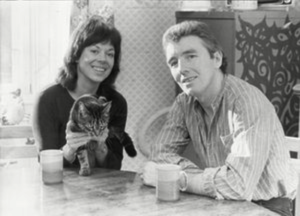by Rupert Wolfe Murray
How do I review a book I have never read? Easy – write about the launch. On the 5th of March Sara Trevelyan launched her new memoir which is called Freedom Found.
But writing about a book launch is boring. What can I say? Lots of people were there! Great speech! Delicious food and wine! The bookshop is wonderful and so is the publisher!
That’s not my style. I don’t do puff (although I did do PR for many a year). What I can do tell her story, share some observations from the launch and explain my family connections to the author.
Who is Sara Trevelyan?
Sara was a medical student specialising in psychiatry when she heard about Jimmy Boyle. His story struck a chord with her (she had been interested in prison reform from her student days in London). She visited Jimmy at the Special Unit in Glasgow’s notorious Barlinnie Prison, fell in love and they ended up together. They got married in 1980, when he was still in prison, and were taunted by the Scottish tabloids who felt it wrong that a convicted murderer could become an artist and a writer. After his release in 1982 they set up a charity called Gateway Exchange, which offered art therapy for ex-cons and people with AIDS, had two children and lived in Edinburgh for about 14 years. Eventually they got divorced; Jimmy now lives in Morocco and Sara lives in Findhorn in the north of Scotland.
My mother was running Canongate Publishing at the time (this was in the 1970s) and she got hold of a copy of Jimmy’s autobiography which had been smuggled out of jail by Anne Goring and Ricky DeMarco. It became Canongate’s first bestseller: A Sense of Freedom.
Jimmy has written two books about his prison experiences and has been involved in many more; he was an inspiration to the arts world and the great German artist Joseph Beuys visited him in prison. But Sara never wrote her side of the story – until now.
 The Special Unit at Glasgow’s Barlinnie Prison had been set up in the 1970s. It’s a story about hardened criminals becoming artists, an example of how prison can transform people for the better, a story with an unhappy ending as it was closed down by the authorities who couldn’t accept its sense of freedom. I can’t understand why every prison doesn’t have a special unit, a place where prisoners can leave their anger and hurt behind and discover their creativity. I put this question to Sara at the book launch and she told me to travel the world in search of an answer to this question.
The Special Unit at Glasgow’s Barlinnie Prison had been set up in the 1970s. It’s a story about hardened criminals becoming artists, an example of how prison can transform people for the better, a story with an unhappy ending as it was closed down by the authorities who couldn’t accept its sense of freedom. I can’t understand why every prison doesn’t have a special unit, a place where prisoners can leave their anger and hurt behind and discover their creativity. I put this question to Sara at the book launch and she told me to travel the world in search of an answer to this question.
I just looked up Jimmy Boyle on the internet and came across a profile of him on a site called biography.com. In the Quick Facts part, it says he was born in Glasgow in 1944 and lists his occupation as Artist, Murderer, Writer.
My mother took me to visit Jimmy in the 1970s, and so I can say I’ve been to prison. I have a clear memory of huge guards in the hallway of Barlinnie Prison, in black uniforms and peaked military-style hats, stomping around the entrance hall, chains swinging off their hips with massive bunches of keys. They were like the fearsome monsters from children’s fairy tale: terrifying but intriguing.
Observations from the book launch
Sara gave a good speech at her book launch. She said “a lot of us want to share our lives but we get blocked, often by fear,” and in this context she mentioned my book, 9 Months in Tibet, in which I explain how I overcame my fear of travelling alone.
She said some interesting things about divorce, reflecting her solid spiritual foundations (she has spent most of her life searching for spiritual meaning). There was no trace of bitterness towards her ex. She said “we were going in such different directions…we married to set each other free…it’s not a failure – our marriage taught me so much.”
Sara works as a therapist and has a positive outlook on life. She described rejection by a publisher as a “writer’s initiation”. Her description of her parents’ divorce in the 1950s – when divorce was a rare and a “shameful” thing – had a silver lining as her mother emigrated to Australia (where Sara was brought up) and it gave them a new lease of life.
She doesn’t seem to share my own gloomy prognosis of the Special Unit. I think it’s a tragedy that it was closed but Sara said it “seeded its philosophy into the prison system” and things are now better in the Scottish prison system (but dire in England where it has been semi-privatised). Apparently, the Special Unit model has been picked up and is still running in the Netherlands and Scandinavia.
There is a lot of resentment within the prison system, not just among prisoners but also among staff – who don’t get enough training, recognition or therapeutic support. The prison officers resent it when one of their charges becomes successful. When Jimmy Boyle walked out of Saughton Prison as a free man in 1982 the prison governor ignored him. Not a word of congratulation or support
She ended with an appeal to reform the prison system: “how can you expect people to behave when you humiliate them?” Our duty is to “help them build their confidence and skills and let them re-assess their lives.” It’s clear to me that the prison system has a long way to go before it makes any sense in our modern world – it still operates by nineteenth century rules of iron doors and iron discipline.
I can’t wait to read the book.
- 1917 (2019) - 11th January 2020
- The Shakespeare Soap Opera - 10th June 2016
- On the Road with Madame Bovary - 4th April 2016










